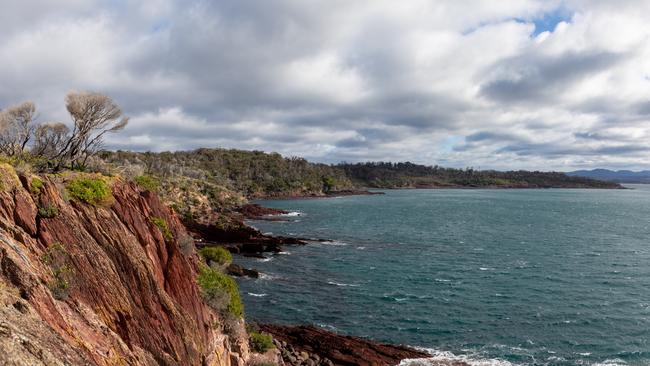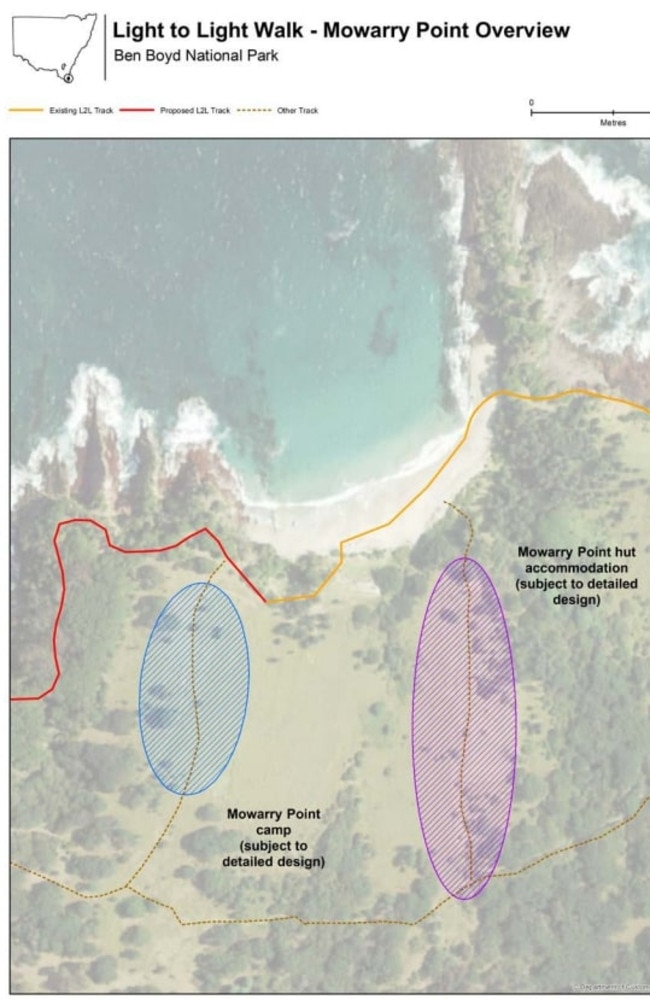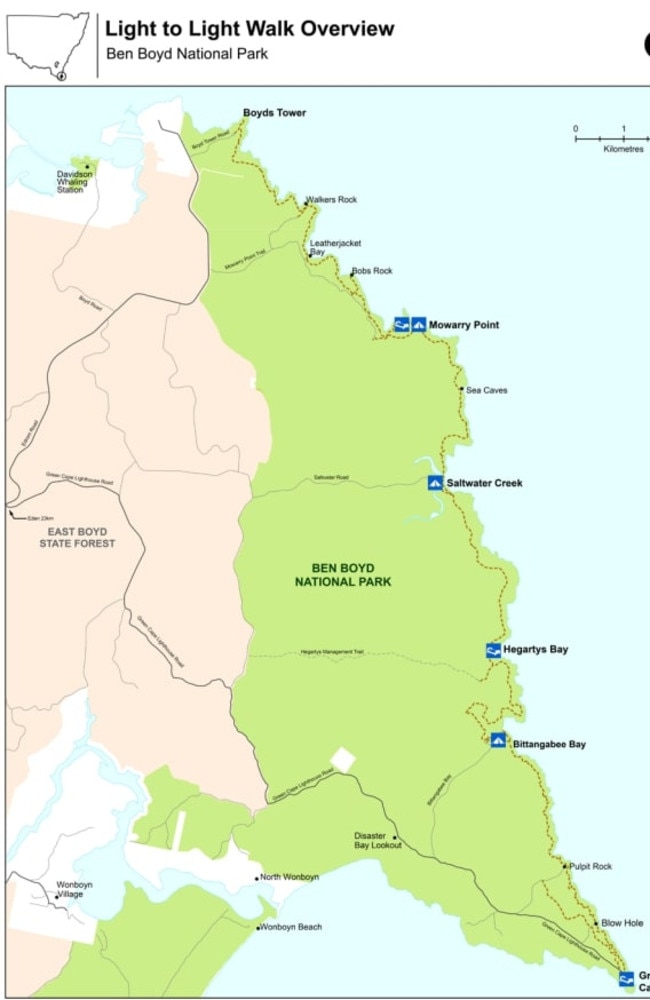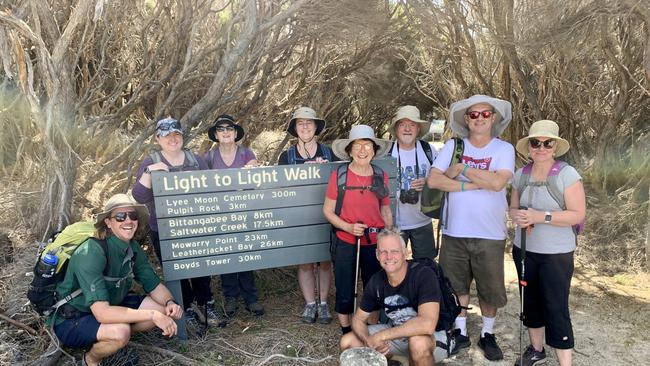Popular south coast walk ‘at risk’ from landmark luxury development
A popular far south coast walking trail in a national park is at risk of being privatised, say residents who fear a luxury development planned for the area will do more harm than good.
The South Coast News
Don't miss out on the headlines from The South Coast News. Followed categories will be added to My News.
More than 150 years after Benjamin Boyd first landed near Eden in his slave ship and the sound of ankle chains will be replaced by helicopter rotor blades as construction on a “landmark” new development draws near despite opposition.
The fire-damaged landscape of Ben Boyd National Park is a popular hiking destination owing to its rugged coastal beauty and relative isolation.
Under State Government plans to redevelop the park’s renowned Light to Light Walk, local groups warn helicopters will be brought in and helipads established in areas still regenerating after the fires to fly in prefabricated materials for the construction of three huts along the 30km trail.
The Ben Boyd Light to Light Community Action Group has been vocal in its opposition to the development, and warned with 170 infrastructure projects on the horizon in national parks across Australia, the redevelopment of Ben Boyd National Park would set a precedent for similar developments to follow.
“This is a landmark case in NSW,” group spokesman Jessica Barker said.
“It’s the first big accommodation complex development to be built, but there’s several more in the pipeline.
“We’re just trying to put out a spotfire here, but there is a much bigger push nationwide.”
Three hectares of land will be cleared in construction of the depots, with another three hectares being indirectly impacted.
“You’re looking at six hectares inside the national park, which has been probably 95 per cent severely affected by bushfires and is in recovery,” Ms Barker said.
“Then there’s the ongoing maintenance of bringing in and out gas bottles and staff, and there is a real risk that with the cruise ships coming into Eden, they could just helicopter people in and off the ships.”

In a statement from the NSW Department of Planning, Industry and Environment, the agency confirmed the use of helicopters in construction of the project, but said use of the helicopter feel operated by NSW Parks and Wildlife Service was not unique to the Eden development.
“The location of these works make heli-lifting the most efficient way to move equipment and materials with minimal impact on park and disruption to park users,” the agency said.
“Helicopters will be used during the construction stage of the project or if required to transfer larger items to and from the accommodation precinct.
“They will not be used to ferry visitors into or out of the huts on the Light to Light Walk.”
Nonetheless, Ms Barker worried flights could number in the thousands and could continue even after the structure is built, possibly harming the environment which houses a number of rare birds and other indigenous animals.
The project has faced stiff opposition from local committees and stakeholders since it was first made public in 2018.
Ms Barker said while some of the groups’ demands had been met by the NSW Department of Planning, Industry and Environment when they revised the plan in 2020, including guarantees the trail access would remain public, many issues remained unaddressed.
The future of free pack-camping in the park is a key issue for the group, with the renovation of existing camp grounds into the new accommodation huts pushing out public campers initially barred from accessing the route at all in the initial draft plan.
Pack camping on the Light to Light Walk will be restricted to purpose-built, walk-in only camping sites at Mowarry Point and Bittangabee Bay, with all car-based camping and near-car camping restricted to two camping sites.
“It feels like their steamrolling ahead without necessarily receiving or taking on board the community‘s views,” she said.
“Why isn’t the community’s voice being heard, and what can we do to be heard before its all too late.”

Tented or hard-roofed accommodation will be built at Mowarry Point, Bittangabee Bay and outside the Green Cape light house station complex.
The cost of staying in the new huts has never been released, but based on the precedent set by earlier Great Walks of Australia projects, including the Three Capes Walk in Tasmania, the cost could be anywhere between $400 and $900 a night, Ms Baker said.
Travellers would be required to do all three nights of the trek, as per the existing brief.
The aim of the project is to attract more visitors to the walk, providing an opportunity for more people to experience the relatively unspoilt and natural coastline, according to planning documents.
“The multi-day walks will be managed by NPWS, and the price point will be determined based on the quality of the packaged accommodation and experiences,” the project states.

“A system for managing overnight walker numbers will be introduced, such as via bookings, permits, or local policies.
“Walkers will be able to undertake the walk self-guided or guided with a licensed commercial tour operator.”
Tour companies operating in the area have also raised alarm bells about the project.
The Sapphire Coast Guiding Company is the area’s only locally-based tour operator, and while owner Cam Reed welcomed investment in the park, he questioned whether the project was right for the area and expressed concerns that operation of the track could be given to a single operator in the future, in a similar fashion to the Three Capes Walk in Tasmania which is also involved in Great Walks of Australia.
“I certainly don’t think taking that massive leap and putting in a small village into two locations on the walk is necessary,” he said.

“The other concern there is that that there is the potential in the future for this to be to turned into another (paid walk), where you’ve just got one operator, whose maybe the highest bidder or the person with friends in the right places, that ends up managing that whole experience.
“And that pushes out other small business, so I suppose that’s a pretty big concern of ours as well.”
A NSW Department of Planning, Industry and Environment spokesman said the government would own and operate the huts, including the current accommodation at Green Cape Lightstation.
“NPWS will run an open and transparent process for any commercial operations as part of the Light to Light Walk,” the spokesman said.
“NPWS welcomes the interest from local operators in applying.”
Nonetheless, Mr Reed said the current trend of luxury developments taking place within national parks across Australia was alarming.
“You walk into these places and all you can hear is helicopters, and it really does take away from that experience,” he said.




